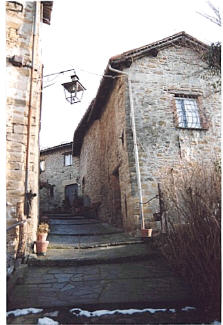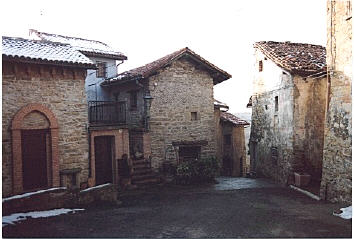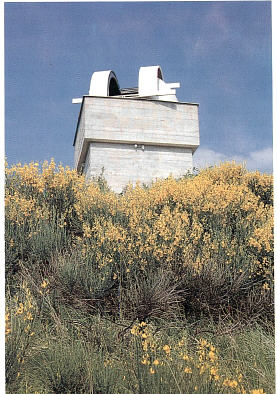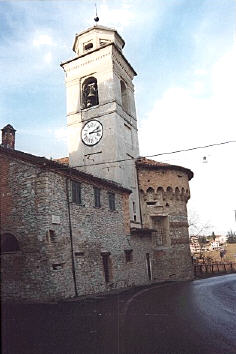
MURTOI'S
 |
MURTOI'S |
|
PYRENEAN
MASTIFF
|
After visiting Murtoi's Kennel, struck by the  extraordinary strength, meekness
and beauty of Pyrenean Mastiffs, we went back to Lerma. Our bus stopped in the
wide square from which wecould admire the landscape below. Woods, the water
of stream Piota that still today furnish the old Mill, the bell tower of a small
village not far away, vineyards. The first visit was for the medieval castle
of the Spinolas, built in XIV century; to its centre, Recinto street with its
houses
extraordinary strength, meekness
and beauty of Pyrenean Mastiffs, we went back to Lerma. Our bus stopped in the
wide square from which wecould admire the landscape below. Woods, the water
of stream Piota that still today furnish the old Mill, the bell tower of a small
village not far away, vineyards. The first visit was for the medieval castle
of the Spinolas, built in XIV century; to its centre, Recinto street with its
houses  mede
up of rocks, the vases full of flowers, its archivolts, the Parish Church of
Saint John the Baptist dating back to XV century; the ancient oratory, the "Lea".
At about midday, we decided to make a short stop at "Ciak Bar" set in the centre
of the town where we were welcomed by a nice man, Maurizio, and we could taste
a wonderful aperitif, later on some of us had lunch in the typical restaurant
"Italia", enjoying good wines, ravioli made with nettle (called Lermini), the
generous grilled meats. Someone preferred the Ligurian Piemontese cooking of
"L'antica Lea" Restaurant, where they could taste polenta and stockfish and
trenette with pesto. In the afternoon the group split, some preferred the freshness
of the Town Swimming Pool and the park and the sunny meadows. Others preferred
stream Piota and its small lakes and its wonderful valley. We gathered to go
on with our tour to the main Sanctuary "
mede
up of rocks, the vases full of flowers, its archivolts, the Parish Church of
Saint John the Baptist dating back to XV century; the ancient oratory, the "Lea".
At about midday, we decided to make a short stop at "Ciak Bar" set in the centre
of the town where we were welcomed by a nice man, Maurizio, and we could taste
a wonderful aperitif, later on some of us had lunch in the typical restaurant
"Italia", enjoying good wines, ravioli made with nettle (called Lermini), the
generous grilled meats. Someone preferred the Ligurian Piemontese cooking of
"L'antica Lea" Restaurant, where they could taste polenta and stockfish and
trenette with pesto. In the afternoon the group split, some preferred the freshness
of the Town Swimming Pool and the park and the sunny meadows. Others preferred
stream Piota and its small lakes and its wonderful valley. We gathered to go
on with our tour to the main Sanctuary " Our Lady of Rocchetta", built in 1290
on one side of stream Piota, just at the natural entrance of Capanne of Marcarolo.While
the sun was loosing its summer aggressiveness, we made the last visit that had
been planned for that day: the Romanesque Church of XI century set inside
Our Lady of Rocchetta", built in 1290
on one side of stream Piota, just at the natural entrance of Capanne of Marcarolo.While
the sun was loosing its summer aggressiveness, we made the last visit that had
been planned for that day: the Romanesque Church of XI century set inside  the cemetery walls, the light that entered
through the long and narrow windows in the fašade, creating inside the wide
aisle a fascinating, almost mysterious light game, that giving prominence to
the force and expressivity of the frescos. The sacredness of the place and the
atmosphere of the past that we could nearly touch brought us in a respectful
silence towards deep thoughts and reflections about the history of those places,
men's works, the necessity of memory. The bus reached us but we preferred going
back in town walking along the ancient path that links that place to the Castle
and the town centre, protracting that pleasing moment of meditation and peace.
We had lunch and spent the night at "Cirimilla" Hotel, set in the woods with
the flowing of two streams: Piota and Gorzente. When dinner was over, there
was a surprise, a very nice excursion to the Astronomic Observatory "Alessandra
Ferrari and Ilaria Merlo", placet on the top of an isolated hill among vineyards
and brooms. It is
the cemetery walls, the light that entered
through the long and narrow windows in the fašade, creating inside the wide
aisle a fascinating, almost mysterious light game, that giving prominence to
the force and expressivity of the frescos. The sacredness of the place and the
atmosphere of the past that we could nearly touch brought us in a respectful
silence towards deep thoughts and reflections about the history of those places,
men's works, the necessity of memory. The bus reached us but we preferred going
back in town walking along the ancient path that links that place to the Castle
and the town centre, protracting that pleasing moment of meditation and peace.
We had lunch and spent the night at "Cirimilla" Hotel, set in the woods with
the flowing of two streams: Piota and Gorzente. When dinner was over, there
was a surprise, a very nice excursion to the Astronomic Observatory "Alessandra
Ferrari and Ilaria Merlo", placet on the top of an isolated hill among vineyards
and brooms. It is  one
of the most important in Italy and it allows wonderful excursions in the starry
skies. The morning after was devoted to a walk near "L'Albarola", an ancient
sighting tower dating back to X century, in a very strategic position, on the
top of a hill. Then we went on through the paths of Capanne Park, along the
picturesque Lavagnina Lake, up to the clung Casaleggio Castle and the heap of
(aurofodinae?????) rocks. At lunch time we went to "Burlino", an old farmstead
in the nearby hills, skilfully renovated and now used for farm holydays. Under
a cool bower we tasted some typical dishes and we enjoyed a home-made cake,
then some of us set for a horse riding among woods and wineyards. Others, more
experts went to the Horse Centre "Le Miniere", for a more difficult walk inside
the Park. In the evening, very satisfied for having "tasted" these wonderful
corners of the past carefully kept, one last excursion to the Philarmonic Society,
set in the town centre, where a fond collector of pictures representing the
beauty of Lerma villane and its ancient traditions, had carefully, but especially
passionately, a very suggestive exhibition of this village, so far away but
still so near; and then, before leaving we bought wines and the typical products
of the place. Everyone of us had the time to back in his mind to a trip so full
of nice surprises between past and present, history and teasures of art.
one
of the most important in Italy and it allows wonderful excursions in the starry
skies. The morning after was devoted to a walk near "L'Albarola", an ancient
sighting tower dating back to X century, in a very strategic position, on the
top of a hill. Then we went on through the paths of Capanne Park, along the
picturesque Lavagnina Lake, up to the clung Casaleggio Castle and the heap of
(aurofodinae?????) rocks. At lunch time we went to "Burlino", an old farmstead
in the nearby hills, skilfully renovated and now used for farm holydays. Under
a cool bower we tasted some typical dishes and we enjoyed a home-made cake,
then some of us set for a horse riding among woods and wineyards. Others, more
experts went to the Horse Centre "Le Miniere", for a more difficult walk inside
the Park. In the evening, very satisfied for having "tasted" these wonderful
corners of the past carefully kept, one last excursion to the Philarmonic Society,
set in the town centre, where a fond collector of pictures representing the
beauty of Lerma villane and its ancient traditions, had carefully, but especially
passionately, a very suggestive exhibition of this village, so far away but
still so near; and then, before leaving we bought wines and the typical products
of the place. Everyone of us had the time to back in his mind to a trip so full
of nice surprises between past and present, history and teasures of art.
The Mayor - Arata Massimo